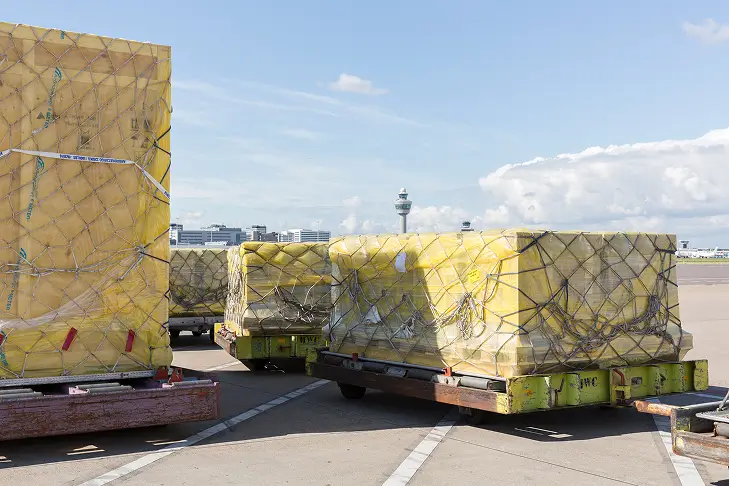When trade policies shift overnight and new tariffs reshape global markets, logistics professionals face mounting pressure. Every regulatory change can disrupt carefully planned supply chains. Every route adjustment affects production schedules and customer commitments.
For operations managers responsible for international freight flows, traditional solutions often fall short. However, air freight charters have evolved beyond emergency backup plans. They now serve as strategic tools for navigating trade uncertainty.
Current Market Volatility: What the Data Shows
According to the Rhenus June 2025 Air Freight Market Update, global capacity increased 3% year-on-year. Passenger belly capacity drove most growth at 6%, whilst dedicated freighter capacity rose only 2%. Meanwhile, demand grew 6% overall, creating interesting supply-demand dynamics.
However, these headline figures mask significant regional variations. The Transpacific corridor experienced sharp volume declines due to tariff changes and de minimis exemption removals. Consequently, airlines redeployed aircraft to stronger routes or temporarily parked capacity entirely.
For logistics planners, this creates a complex puzzle. Traditional shipping lanes become unreliable precisely when businesses need them most. Therefore, alternative solutions become essential rather than optional.
Trade Agreement Changes: Real-World Impacts
Recent regulatory shifts demonstrate how quickly supply chains must adapt. New US customs requirements now demand more detailed cargo descriptions for air shipments. Vague terms like "electronics" no longer meet compliance standards.
Similarly, the August 2025 tariff restructuring introduced tiered rates affecting dozens of trading partners. UK imports face 10% tariffs, whilst Switzerland encounters 39% duties. These changes force immediate sourcing adjustments.
Latin American fruit exporters exemplify this adaptation. They've redirected shipments from China to European markets ahead of potential US tariffs. Vietnamese manufacturers similarly reduce reliance on Chinese supply chains whilst exploring new trade partnerships.
Why Air Charter Solutions Enable Strategic Flexibility
Unlike scheduled freight services, air charters provide operational agility when markets shift. Charter solutions offer several key advantages for strategic sourcing:
Route Customisation: Direct flights bypass congested hubs and avoid capacity constraints on popular routes. This proves especially valuable when traditional lanes face disruption.
Timing Control: Charter services adapt to your schedule rather than airline timetables. This flexibility becomes crucial when regulatory deadlines approach unexpectedly.
Cargo Specialisation: Temperature-sensitive pharmaceuticals, oversized equipment, and hazardous materials receive appropriate handling throughout the journey.
Documentation Support: Experienced charter coordinators understand complex customs requirements across multiple jurisdictions. This expertise helps navigate evolving compliance landscapes.
Our Cargo Charter Service demonstrates how these capabilities support complex logistics requirements across diverse industries.
Strategic Implementation for Operations Managers
Forward-thinking logistics teams now integrate charter solutions into their standard planning processes. This approach provides several operational benefits:
Risk Mitigation: Multiple transportation options reduce dependency on single carriers or routes. When scheduled services face disruption, charter alternatives maintain supply chain continuity.
Cost Optimisation: Strategic charter usage often proves cost-effective compared to production delays or expedited shipping on congested routes. Early relationship-building enables better pricing when urgent needs arise.
Compliance Assurance: Charter specialists understand international regulations and documentation requirements. This expertise reduces customs delays and compliance risks.
Stakeholder Confidence: Reliable backup plans reassure senior management and customers that delivery commitments remain achievable despite market volatility.
Practical Steps for Logistics Professionals
Successfully incorporating charter solutions requires proactive planning rather than reactive crisis management:
Develop Provider Relationships: Establish connections with reputable charter brokers before urgent needs arise. Early engagement improves service quality and pricing negotiations.
Monitor Trade Developments: Stay informed about regulatory changes affecting your key supply routes. Industry compliance updates help anticipate potential disruptions.
Create Hybrid Strategies: Combine scheduled services with charter options based on cargo urgency and route reliability. This balanced approach optimises both cost and security.
Document Lessons Learned: Track which charter solutions work best for specific scenarios. This knowledge improves future decision-making and vendor selection.
Current Market Outlook and Planning Considerations
Industry forecasts suggest continued volatility throughout 2025. The Rhenus report anticipates ongoing challenges from unresolved trade negotiations and regional tensions affecting key shipping lanes.
Air freight market analysis indicates that consumer caution and policy uncertainty will maintain pressure on traditional shipping patterns. Consequently, flexible logistics solutions become increasingly valuable.
For operations managers, this environment demands scenario planning and contingency preparation. Charter services provide the agility needed to navigate uncertain trade conditions whilst maintaining operational efficiency.
Technology and Compliance Considerations
Modern charter operations leverage advanced tracking systems and real-time communication protocols. These capabilities provide the visibility that logistics managers need for stakeholder reporting and inventory planning.
Furthermore, regulatory compliance becomes simpler when working with experienced charter coordinators. They understand country-specific requirements and can anticipate documentation needs for complex international movements.
Our comprehensive Aircraft Guide helps operations teams understand different charter aircraft capabilities and how they align with specific cargo requirements.
Building Resilient Supply Chains
The most successful logistics operations now treat charter services as strategic investments rather than emergency expenses. This mindset shift reflects the reality that global trade uncertainty has become the new normal.
Companies that embrace flexible logistics solutions often capture competitive advantages when competitors struggle with disrupted supply chains. Therefore, strategic charter planning becomes a business differentiator rather than just operational backup.
Moreover, the expertise gained through charter coordination often improves overall logistics capabilities. Teams develop better risk assessment skills and stronger vendor relationships that benefit all shipping activities.
Implementation Framework for Success
To maximise charter service benefits, logistics teams should follow a structured approach:
Assessment Phase: Evaluate current supply chain vulnerabilities and identify routes most susceptible to disruption. This analysis guides charter integration priorities.
Partner Selection: Choose charter providers with relevant industry experience and strong safety records. Verify their capability to handle your specific cargo types and destinations.
Trial Implementation: Start with less critical shipments to build experience and refine processes. This approach reduces risk whilst developing internal expertise.
Continuous Improvement: Regularly review charter performance and cost-effectiveness. Use this feedback to optimise future planning and vendor relationships.
Creating Pathways Through Trade Complexity
As trade agreements continue evolving and regulatory requirements become more demanding, logistics professionals need adaptable solutions. Air freight charters provide the flexibility required to navigate these challenges successfully.
The key lies in viewing charter services strategically rather than reactively. When integrated thoughtfully into overall logistics planning, charter solutions deliver competitive advantages that scheduled services cannot match.
Whether managing pharmaceutical distribution networks, coordinating industrial supply chains, or supporting time-critical manufacturing operations, charter services offer pathways through complexity that keep businesses moving forward.
For insights into how charter solutions continue evolving to meet modern logistics challenges, explore our analysis of air cargo charter transformation.
Conclusion: Strategic Advantage Through Agility
Trade policy uncertainty and market volatility have become permanent features of global logistics. In this environment, the companies that succeed will be those building agility into their supply chain strategies.
Air freight charters provide exactly this kind of operational flexibility. They enable rapid response to regulatory changes and market disruptions that would otherwise compromise supply chain performance.
Ready to explore how air freight charter solutions might support your strategic sourcing requirements? Contact our team for a consultation and discover how we create reliable pathways through your most complex logistics challenges.
Every charter operation we coordinate represents someone's critical supply chain solution. We take that responsibility seriously, applying genuine aviation expertise to ensure your goods reach their destination safely, efficiently, and precisely when needed.
Get in touch with any questions about your air charter needs



